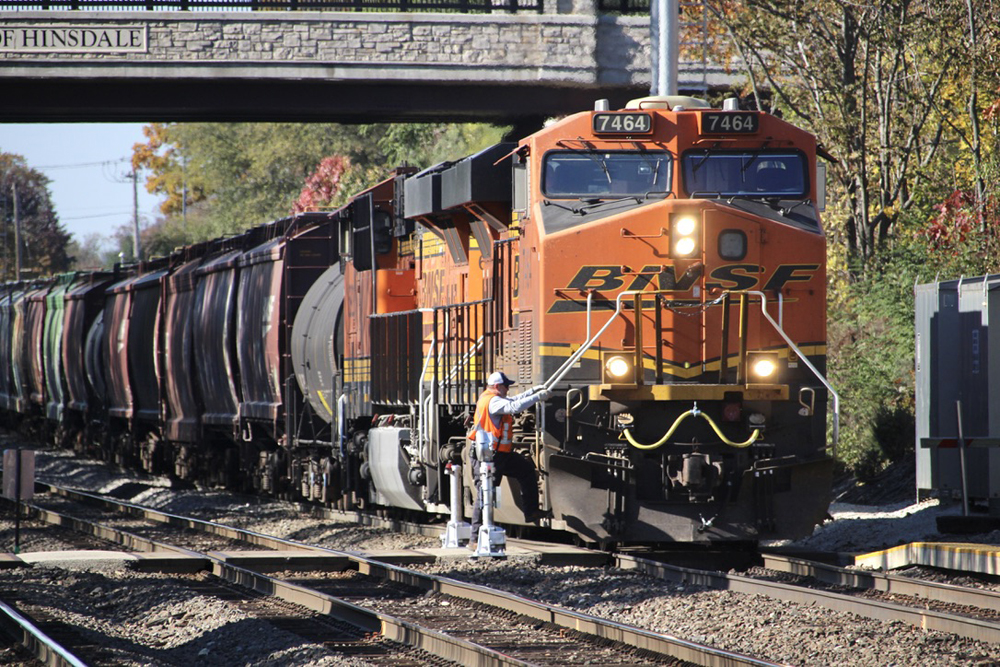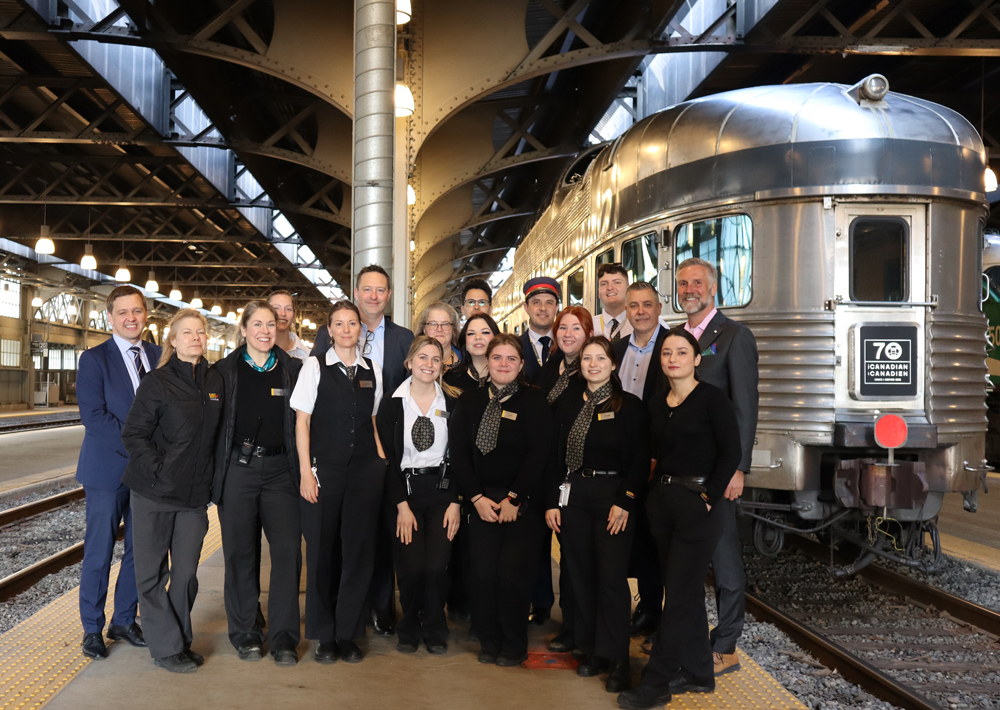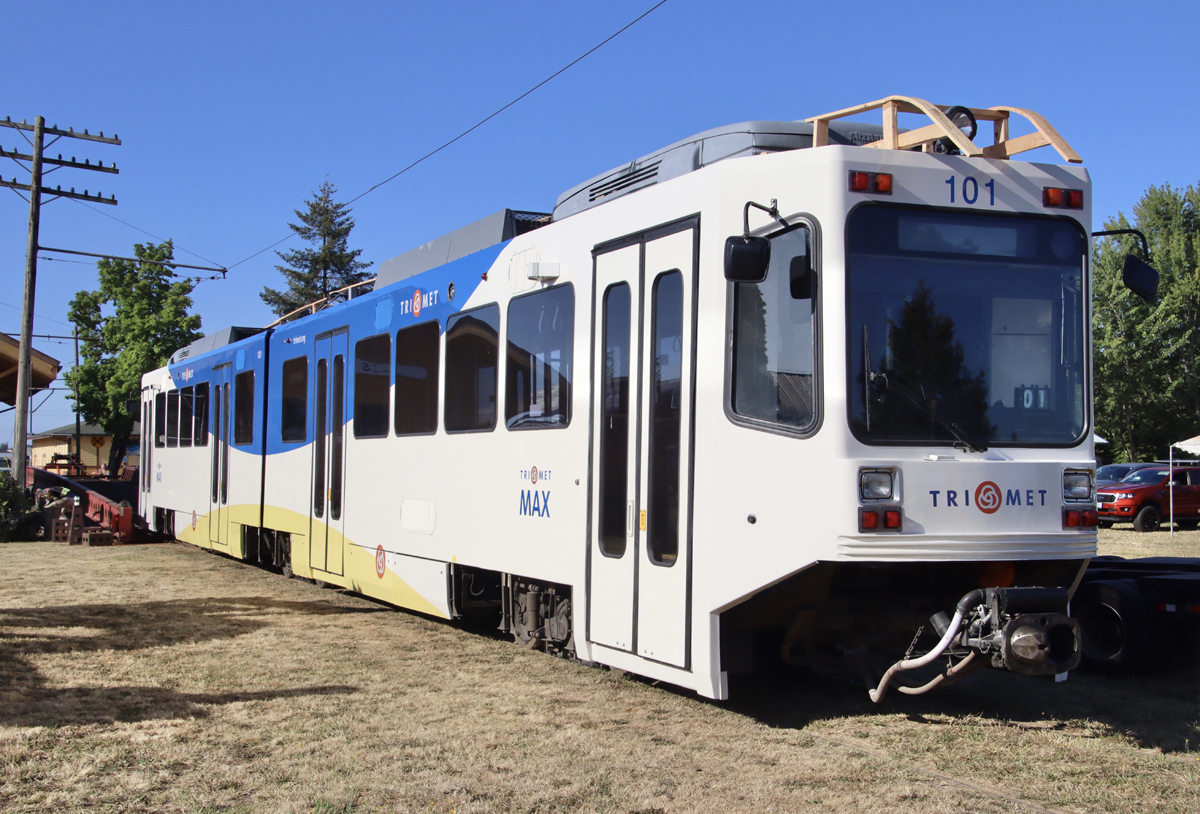
FORT WORTH, Texas — BNSF Railway has modified its controversial Hi-Viz train crew attendance policy in response to employee feedback, but officials at two unions say the changes fall far short of what is needed.
The changes, which take effect June 1, were announced in a video released on Friday.
BNSF launched the policy in February, saying it would help improve crew availability, enable the railroad to remain competitive, and give employees greater visibility into their schedules. But union leaders have been highly critical of the program and threatened to strike over the matter.
“Many of you have raised concerns about the program’s details. We hear you,” Matt Garland, vice president of transportation, says in the video.
Crews can bank up to 30 points under the attendance policy, but lose points when they miss work. If an employee loses all of their points, they can be terminated.
The changes announced on Friday include elimination of the penalty for not working the day before or after a vacation or personal day.
The revised policy also adds new ways crews can earn additional points. Top performers, defined as those who rank in the top 10% for hours worked at their board or station levels, receive seven points. Crews also can earn a point for working the day before or after vacation or a personal day; for working a “high impact day;” and for starts between noon Fridays and noon on Sundays.
In addition, crews can now bank up to 37 points.
“BNSF’s proposed changes to its Hi-Viz attendance policy are unimpressive,” Greg Regan, president of the Transportation Trades Division of the AFL-CIO, said in a statement on Monday.
“These changes do nothing to address the policy’s fundamental flaws. For example, allowing a worker to bank a few extra points will not offset the massive 15-point cost of a worker missing one high-impact day,” Regan said. “In addition, it is appalling that BNSF’s response to widespread reports of worker fatigue is to incentivize this exhaustion. Yet, BNSF’s proposal to reward the top performers, or those who have the top 10% of work hours, is a clear attempt to incentivize these fatigued workers to double down. This will not stand.”
Brotherhood of Locomotive Engineers and Trainmen National President Dennis Pierce called the changes “little more than fluff,” saying the policy “has caused hundreds of BNSF’s employees to quit and it has made recruitment of new employees a nightmare.”
Noting the changes were made without input from unions, Pierce said in a statement that the modifications “do little to meet the members’ or their families’ needs,” and that the changes reflect both the union’s campaign to “expose [the railroad’s] abuses” and pressure from shippers, the Surface Transportation Board, and Congress.
“The sad fact is that the nation’s supply chain challenges are partially due to a 29% cut in rail labor at the Class I railroads over the past six years,” Pierce said. “The Hi-Viz attendance policy exacerbates the breakdown in the supply chain and drives more railroaders away at a time of critical need. Not only is the supply chain failing, but this abusive and punitive attendance policy is breaking apart families and causing locomotive engineers and other railroaders to come to work dangerously fatigued. … It’s time for BNSF as well as other railroads with similar attendance policies to sit down with their unions and negotiate staffing policies that work for the railroads, their customers and their employees.”
— Updated at 11:10 a.m. CDT to correct attribution of union statement to Greg Regan; updated at 2:30 p.m. CDT with statement from BLET President Dennis Pierce.














Mr McFarland is at it again. He has to be a mole for the carriers it’s the only way to explain his ideas. I sincerely challenge him to come work with a real railroader for a month and see what the real world of being a conductor or engineer really is. Have him work under the same conditions as we do including the attendance guidelines we endure every single day and see what his response is after that one month in the life of a rail. Only then can he really try to rationalize the working conditions of railroaders. I’d welcome him in a second to follow me and my colleagues.
The Sad part about it is Since the Pandemic People don’t want to work and it’s Hard on the Employee’s that have to give up there Family lives to get the Freight to it’s destination
I am baffled that with all of this PSR railroading the railroads can’t set up a regular work schedule for their crews. In all seriousness railroads are treating their crews like crap and now they are paying the price.
The railroads have run out of people who want to work like that. It’s one thing if these conditions were once in a while, like after a blizzard, during an unexpected traffic surge, whatever. But for a whole career? No thanks says the American work force.
I worked for Chessie and CSX. We had a milage agreement too, but it was never enforced because the people who controlled the union did not want to limit their earnings.
It is not just the companies who are greedy.
Gerald you have obviously not lived the life. As was mentioned earlier your 8 hours off includes the time driving home. Then showering, eating and maybe getting to bed. Maybe you have an appointment scheduled. How about your laundry? Car needs to get worked on ? The furnace stops working. That 8 hours can easily turn into nothing more than a nap. Six hours after getting off duty your phone can ring. Many things can go wrong out on the road. Leader and Trip Optimizer are a pain. Now throw in PTC. Better watch that screen. And don’t forget computerized dispatching which is a disaster. Anything electronic goes bad you best be prepared to take over immediately. Then you have to explain to someone hundreds or thousands of miles away, who is sitting in a chair at a desk who, what, when, where and why. And you’d better be right about it. I know I’ve had enough and taking early retirement.
I worked as an Engineer for Union Pacific for 42 years.Under our labor agreements we were limited to 3800 miles per month, end of story. Often I could run my miles and have 10 days or more off per month. I assume this was a national agreement . In my years as a local chairman many solutions to improve pool freight schedules and calling times were proposed all required moremanpower. For this reason none were even attempted..
I think the biggest issue would just be staying awake at all…what with Trip Optimizer and all the other software, there isn’t actually a whole lot of action that would cause you to be fatigued. No, working 12 hour days doesn’t cause fatigue as long as you get 8 hours of rest, unless you have an underlying sleep condition that causes you to not get a good 8 hours of rest. There’s plenty of single men out there that don’t have families…using families is just an EXCUSE, you got into the job knowing you would be away from home and not have a regular schedule, don’t blame that on the break up of families.
When was the last time you worked 12 hour days with 8 hours rest for a week or more?!!!
Even if the 8 hours rest was not truly 8 hours (as I believe it is counted from time clocked out to clocked in, not actual rest), and the work was not demanding as you posit, and these front line workers were not often responsible for moving hazardous materials, doing the same thing over and over for 12 hours is fatiguing. Furthermore there is plenty of scientific evidence that shift work that constantly changes slows response times and is fatiguing
Sir you have NO CONSEPT of how this really works. They are called two hours before on duty at any time 24hrs a day seven days a week 365 days a year. The mental stress is the problem. Some one has to watch the “soft ware” all the time to check that it is working properly for 12 hours then have to take over instantly if and when it fails, then if they don’t make it to the away from home terminal they sit and wait for relief crew or van ride to get there. This could be minutes or hours. Then by the time they to get something to eat, and good luck finding some restaurant open at 2am, then they can get rest. They may be there eight, ten, or thirty hours waiting for the call back to work. Just how many hours do you sleep at a time, remember at any time in any 24hr time frame. Many crew members spend more time away from home then they do at home. Single men and, you left out single women, are all feeling the same stress of non normal sleeping conditions. Sir you need to hire out and pass the training then spend 90 days out there before making this kink of statement. Thank you
Obviously someone has never actually worked for the railroad if they think all you do is sit around for 12 hrs straight.
My dad was a locomotive engineer for 40 years. And that’s why I know for a fact that as far as your post above, you sir have absolutely no idea what your talking about.
You have absolutely no idea what working for a railroad entails.